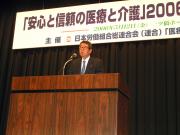Updates
2006 RENGO Central Rally for “secure and reliable medical and care services”
On 12 May, the Medical and Welfare Liaison Council of RENGO organized a Central Rally for “secure and reliable medical and care services”. About 700 participants gathered in the Rally from all over Japan.
RENGO President Takagi opened the Rally, commenting on the Medical Reform bills: “We appreciate compulsory issuance of a detailed receipt describing medical expenses. However, there are many other crucial points to be solved, including the establishment of a new health care system for the aged”. “Workers engaged in the medical and welfare sectors are increasing rapidly, but most of them are not organized. We must get the unorganized to be organized”, he continued.
Professor Miyatake of the Saitama Prefectural University gave a lecture entitled “medical and care services today and tomorrow”. He identified crucial points of the medical reform and emphasized the need to diffuse and improve community medical and care services.
The Rally was then broken into three workshops for nursing, care and comedical personnel. During workshop sessions, participants were given presentations by representatives of the Democratic Party of Japan and the Ministry of Health, Labour and Welfare and reported on workplace realities. They also exchanged experiences and opinions. The Rally was concluded with the adoption of an appeal to “work for the realization of the secure and reliable medical and care system that provides patients and users with necessary services in a secure manner.
RENGO’s Medical and Welfare Liaison Council is planning to take an action towards the Ministry, taking into account conclusions of the Rally.
An appeal
We gathered today in a Rally for “secure and reliable medical and care services” with 900 workers in the medical and care sectors coming from all over Japan.
The Rally marks the 10th anniversary, the 1st one being organized in 1997 with the theme of “a course of medical/nursing services”.
A great wage of the reform in medical and care services is now surging over Japan, coincidentally with the 10th anniversary of the RENGO’s Rally. The care insurance system turned the new page last year with new plans enshrined in the revised law, such as the introduction of preventive allowances and the establishment of multi-functioning community centers. Also, medical and care fees were revised simultaneously in April this year.
In the 164th regular Diet session that is going on currently, medical reform-related bills are being discussed. The bills are scheduled to be passed on to the House of Councilors from the House of Representatives shortly. However, the House of Representative has not had sufficient discussion particularly on the establishment of a new health care system for the aged and the revision of the medical insurance system that would require heavier burden on patients. Moreover, in regard to the institutional reform in the provision of medical services, attention should be paid not only to the insufficiency of doctors, but also to the establishment of better working conditions for nursing and comedical personnel. There are a lot of issues left to be clarified in Diet deliberation.
We today received Professor Miyatake’s keynote speech entitled “medical and care services today and tomorrow”, by which we were able to deepen the understanding of the significance of the proposed medical reforms and the revised Care Insurance Law. We now have wider perception of issues that are crucial to medical and care services, as well as of how they should or would be in future.
We exchanged experiences and opinions throughout deliberation of the three workshops and recognized others’ troubles as our common challenges.
Workshop 1 (the patient-centered nursing) provided an opportunity to deepen the understanding of Diet deliberation on bills on the revision of medical fees and medical reforms in relation to the 6th Nursing Supply and Demand Prospective Plan that was announced in December last year. We also discussed work organization of nursing personnel and cooperation between users and communities.
Workshop 2 (the revised Care Insurance Law and care workers) deepened the understanding of changes in the system to scrutinize effects of revised systems and fees on employment and working conditions of care workers. It also provided an opportunity to share information on how working conditions could be improved in various workplaces.
Workshop 3 (the effect of changes in medical laws and medical fees on co-medical and allied health personnel) discussed various issues that co-medical and allied health workers are faced with and deepened mutual understanding. It provided an opportunity to reaffirm how work arrangements should be made for different jobs.
The Medical and Welfare Liaison Council of RENGO will take an action toward the Ministry of Health, Labour and Welfare, taking into account the deliberation of the Rally. We keep working together with the affiliates and local RENGOs toward the realization of “secure and reliable medical and care services” for all working in the medical and care sectors to work proudly and for patients and users to receive necessary services in a secure manner, not being swallowed up by the waves of reforms.
12 May 2006
RENGO Central Rally for “Secure and Reliable Medical and Care services”
Updates 2006
- December (5)
- November (1)
- October (4)
- September (4)
- August (8)
- July (11)
- June (22)
- May (14)
- April (7)
- March (13)
- February (10)
- January (6)
